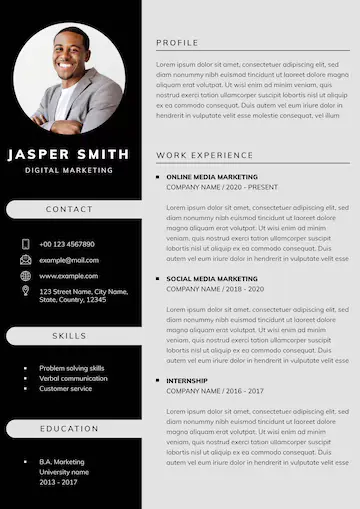
Charles Dickens
Career Expert
2023-11-24 11:28:34

In today's competitive and intense environment, finding a good job is anything but a piece of cake. Job-hunting can be exceptionally frustrating, especially for young people who always pursue nailing the interview. In this article, we will help you create an outstanding resume by guiding you on mentioning travel in a resume.
How can a hobby like travelling help me get a job? Am I reading it right? Millions of questions must have crossed your mind, but believe us, you can land a good job with handsome pay and continue your hobby by adding your travel experiences to your resume. It can be a unique addition to your ordinary resume.
With travelling comes excellent experiences and knowledge. You learn about the culture and people around the world.
As per research, travelling changes a person for the better. Moreover, having international work experience or having knowledge of a particular area can make your resume look good. So, whenever you travel, analyze your surroundings to speak confidently about it in your upcoming interviews.
Now, let's get to the business: How will you add onsite travel to your resume strategically that looks professional and highlights your credentials? We will discuss 6 ways to attract the employer's attention and leverage your journey into getting a good job.
6 Ways To Add Travel To Your Resume are:
Travel Experiences
Be Professional
Placement of Travel Experience on Resume
Acquired Skills
Language Skills
Digital Media Experience
1: Travel Experiences
Even if every trip has some value, just include the journey that will help you in your future professional endeavours. While taking trips is a great life experience, employers aren't interested in hiring people who travel purely for fun. However, experiences such as visiting fascinating third-world nations, volunteering overseas, and picking up new languages and abilities have undoubtedly made you a more understanding and culturally aware global citizen, and those are the kinds of things you ought to emphasize in your CV.
Perhaps a vacation you took helped you become aware of the field you are currently attempting to work in. Describe how your love for travel led to your dedication to that line of employment. Your travel experience can look good on your resume if it makes you a more valuable candidate for a job in the future.
2: Be Professional
As previously said, not every trip advances one's professional career. On a professional resume, travel devoid of any obligation is inappropriate. Don't write about vacations where you spent all your time partying and tanning. Employers aren't interested in your vacation unless it equips you with valuable skills for their business.
Therefore, don't write about it if you feel you matured or improved as a possible employee, learned anything new, or gained valuable experience. Leave that room on your CV for the important information.
3: Placement of Travel Experience on Resume
Depending on the kind of travel, your resume may or may not list it.
If you truly had a job with regular hours and a job description, add it to the "Work Experience" area. If your volunteer work is relevant to the job you are applying for, even if it was unpaid, put it in the "Work Experience" part of your resume.
Put your volunteer experience at the top of your resume if it is relevant to the position you are applying for. Employers want to see the most relevant information first.
Include your overseas volunteer experience in a separate area if it was beneficial to you but still unrelated to the position.
A "Volunteer Work" area is a great place to keep track of all the volunteer work you've done. Alternatively, you can list volunteer work under a resume's "Special Skills" area if it taught you a particular talent.
4: Skills Acquired
Regarding unique skills, mentioning any that you picked up while exploring the globe is essential. Finding an appealing method to highlight your talents to potential employers is crucial to understanding how to include travel in a resume.
You must understand the distinction between "hard skills" and "soft skills."
Hard skills can be taught, such as picking up a language, a craft, or a sport. They are highly particular and may typically be quantified or rated.
Soft skills are abilities you develop throughout life through social interactions and exposure to specific circumstances.
A few examples of soft skills are learning how to communicate, budget, lead a group, adjust, cope with pressure or stress, and negotiate.
Think about the abilities that are relevant to the position and if your resume should include them. Hard skills are always essential to highlight, but sometimes soft skills are not.
You may bring up leadership or organizational abilities, for instance, as they are normally beneficial in any workplace. Your ability to create a budget is only relevant if the position you are applying for involves money. Communication abilities that will show through in your interview and resume, such as being an effective writer, speaker, or negotiator, probably don't need to be listed.
Occasionally, job postings include a list of abilities or characteristics they hope to see in potential hires. You can mention any abilities you developed from travelling if the company specifically requested them.
Language skills
These days, the world is so global and cosmopolitan that you never know when having language abilities would be helpful.
Any competence in a foreign language significantly boosts your resume since many companies hire people expressly for their foreign language skills.
Indicate on your resume whether you are a beginner, intermediate, or advanced speaker, reader, and writer of the foreign language. Never inflate your language proficiency just in case you need to demonstrate your abilities at work and cannot meet your resume's high standards.
Digital Media Experience
If you are applying for any job that includes communications, marketing, public relations, writing or journalism, ensure you include any blogging, photography or social media you may have done abroad.
Not the Instagram pictures you uploaded while on vacation. Share the times you participated in a work exchange where you worked in digital marketing or photography.
Include any digital skills you acquired while volunteering and travelling overseas on your resume, especially if you can demonstrate them with published work or images.
Social media and digital content are essential to thrive in the contemporary corporate landscape. Therefore, even if you don't work in communications, your company can require social media or photography assistance.
Wrap Up
Sure, travelling the world in a backpack and having a good time is exciting, but volunteering abroad offers something unique and practical. Working while travelling allows you to save money and acquire new abilities that will likely help you in your future career hunts.
More than just speeding through the tourist spots, work exchanges provide deep cultural encounters that improve your skill set and enrich your life.
So go for travel and take a chance. You never know; you might find a new interest or professional route or acquire some abilities that will make an impression on potential employers.
About The Author

Charles Dickens
Career Expert
2023-11-24 11:28:34
Charles is an accomplished resume writer dedicated to shaping impactful career stories. With extensive experience, Charles specializes in unraveling individual professional journeys and highlighting unique strengths to align with specific career goals. Having assisted diverse job seekers across various career stages, Charles emphasizes the transformative impact of a precisely tailored resume.







